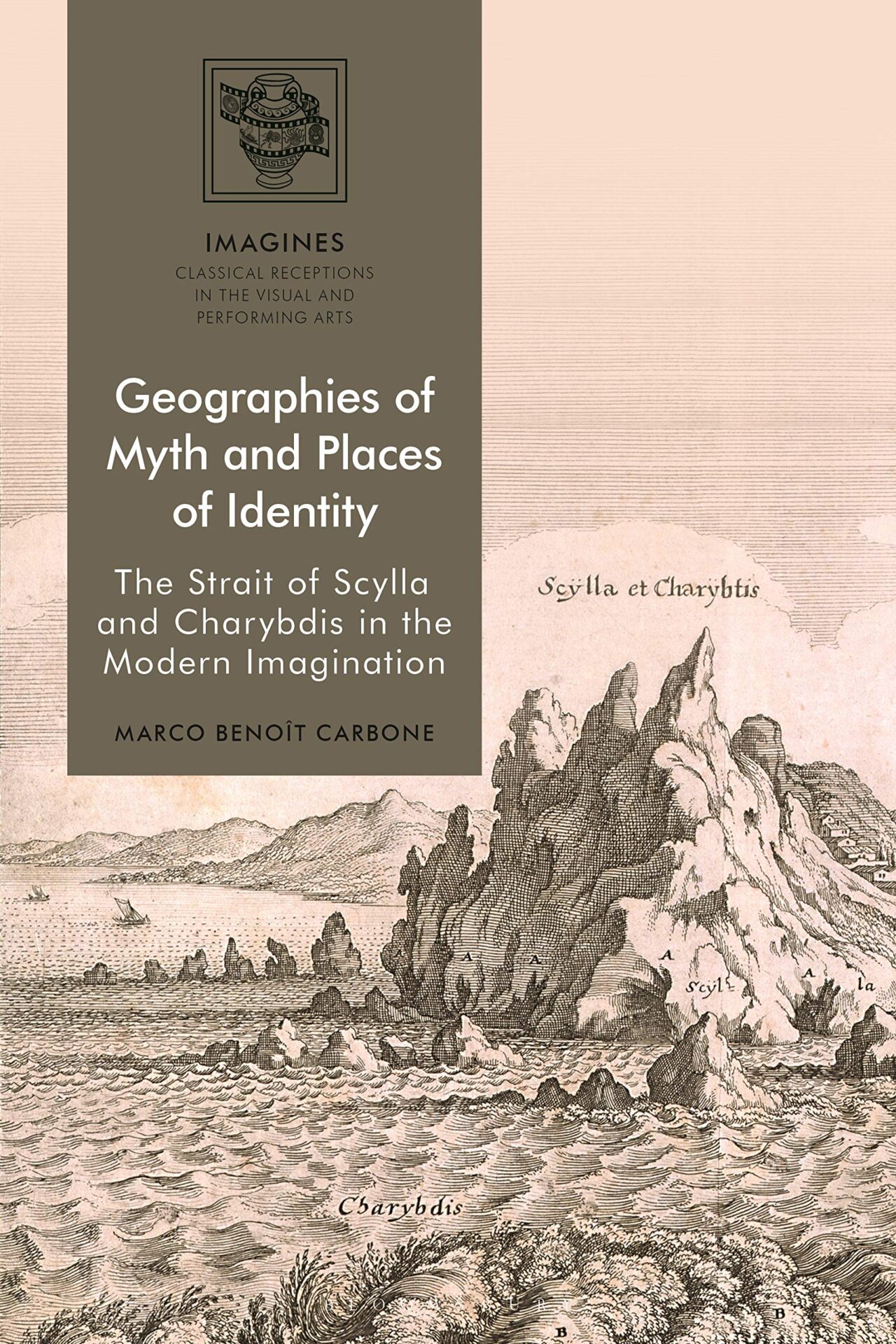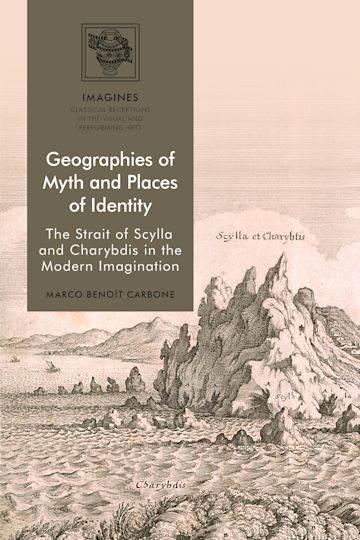The Strait of Scylla and Charybdis in the Modern Imagination
From Bloomsbury.com:
Turning to a region of South Italy associated with the heritage of Greater Greece and the geographies of Homer’s Odyssey, Marco Benoît Carbone delivers a historical and ethnographic treatment of how places defined in public imagination and media by force of their associated historical events become sites of memory and identity, as their landscape, heritage, and mythologies turn into insignia of a romanticised antiquity.
For the ancient Greeks, Homer had set the marine monsters of the Odyssey in the Strait between Calabria and Sicily. Since then, this Mediterranean passage has been glowing with the literary aura of its mythological landmarks. Travellers and tourists have played Odysseus by re-enacting his journey. Scholars and explorers have explained the myths as metaphors of whirlpools and marine fauna. The iconic Strait and village of Scilla have turned into chrono-topic place-myths and playgrounds, defined by their literary aura and the region’s ancient heritage, inspiring representations in media, travels and tourism.
Carbone observes the enduring impact of Hellas on the real Strait today. The fascinations of artists and travellers, and their continuous rekindling of cultural and visual traditions of place have intersected withphilhellenic Western historiographies, shaping local policies, public histories, views of development and tourism, and forms of Hellenicist identitarianism. Elements of society have celebrated the landscape of the Odyssey, appropriated Homer as their imagined heirs and fellow citizen, and even purported themselves as the original Europeans, thus pandering to outdated ideological appropriations of ‘classical’ antiquity and exclusionary, West-centric views of the Mediterranean.
Table of Contents
Introduction (read online / download)
Notes on Places and People
List of Illustrations
2. The Strait of Homer and the Strait of Reality (read an excerpt)
3. Chronotopes of Hellas: The Grand Tour (read an excerpt)
4. Mediterranean Place-Myths (read an excerpt)
5. Myths of Myths: Mapping the Odyssey (read an excerpt)
6. Materialising Heritage: Tourism in Scilla (read an excerpt)
7. Denizens of the Odyssey (read / download an excerpt)
8. Conclusions: (Re)-Imagining the Strait (read an excerpt)
Notes
Bibliography
Index
Reviews
«A work that is both personal and academic, ethnographic and literary, local and international […] His insights into the effects of the interplay between geography and mythology of the Strait coincide with the larger conversation happening now in classics concerning Eurocentrism and racism (to name a few). What is different, and exciting, about Carbone’s work is the movement beyond the text and museum to include local geography and modern culture. The book will be of interest to a wide scholarly audience, including those in classics, anthropology, history, or literary criticism».
Patricia Y. Hatcher, Rhea Classical Reviews.
«This text is an exciting entry in the study of ancient Greece and antiquities. The author skillfully weaves historical analyses of Greece, Homer’s Odyssey, and ancient mythology with ethnographic considerations of the contemporary Strait of Messina. A welcomed and necessary study of the significance of ancient Greek mythology in the contemporary world».
Scott A. Lukas, Professor of Anthropology, Lake Tahoe Community College, USA
«Marco Benoît Carbone brilliantly puts into practice the central task of studies on antiquity today: the liberation from a heterotopic cage in favour of a future utopia where it is possible to re-examine the traditions of European identities from a critical and anti-hierarchical perspective». Anna Chiara Corradino, Cinergie.
«An existential journey around the deep South of Italy and raises questions on relevant and current topics, such as the identity-building process of Calabria. […] A critical approach towards the concept of “classics” and Euro-centrist appropriation of Greek culture by the West». Giulio Pitroso, I.S. Med – Interdisciplinary Studies on the Mediterranean
«A fascinating ethnographic and cultural reading of this geographical corner of Italy. […] Carbone accompanies his thick description of this geographical location with a critical view on the Southern question. […] Honestly includes the voice of the author which interrogates his own ethos as a researcher». Ilaria Serra, Professor of Italian and Comparative Studies, Florida Atlantic University, Italica
«Demonstrates persuasively that the attachment of myth to place is far from a benign fancy, embedded instead in ‘genealogies of meaning and power’ which impact upon the economics, identities and potential futures of communities in the present day. The volume’s urgent ideological underpinning is paired with an innovative methodological approach.» Dawn Hollis, University of St Andrews, The Journal of Hellenic Studies
«In the original perspective offered by Carbone’s study […], the iconographic representation of the ‘Homeric geography’ becomes a privileged – yet little studied – point of view through which to rethink the historical and political process of constructing the identity of the place. The study also offers readers the opportunity not to remain prisoners of their own geographical identity.» Simona Arillotta, IUAV University of Venice, Modern Italy
«[A] spacious exploration […] across the domains of history, memory, landscape, heritage, Eurocentrism, and possibilities for progress. Carbone’s ethnographic approach to Homeric and Greek narratives in southern Italy can be useful for everyone who studies and teaches the artifacts and texts of the ancient Greek world. His work can productively be shared with students, perhaps especially if they are headed off to travel or study in the Mediterranean. […] A model for what some of that work can look like, accomplish, and inspire.» Catherine M. Connors, Professor of Classics, University of, Washington, Arion
«The book’s investigation into contemporary culture and ethnography is an excavation inside the minds, bodies, perceptions and languages of the inhabitants of the ‘scilleccariddi Region’. […] should be read not only as a study of social history or ethnography but also as an essay on the classical tradition.» Monica Centanni, Professor of Greek Language and Literature, The Classical Review
«An innovative investigation into the relationship between the Scylla and Charybdis of the Odyssey and the southern Italian town of Scilla».
Dr Rhiannon Easterbrook, School of Advanced Studies, University of London, Greece and Rome
«Un auspicio e di un’idea progettuale, non soltanto per lo Stretto o per la Calabria, quanto piuttosto per l’intero Mezzogiorno e per tutte quelle comunità che tendono a richiudersi in sé stesse in nome delle proprie antiche radici, impreparate a emanciparsi verso una modernità possibile.» Dr Lucia Di Girolamo, Università degli studi della Campania Luigi Vanvitelli, Progetto Oblio
To request review/complimentary copies:
– marcobenoitcarbone at gmail dot com
– Bloomsbury.com

